In the competitive business world, big brands such as Amazon, Netflix, Google, Walmart, and Alibaba stand out with their unique operational methodologies.
Despite attempts by numerous other well-known firms to replicate their strategies, achieving comparable success has proven challenging.
with Expert DevOps
Services. Your trusted tech parter to deliver
DevOps solutoins with decade of
experience serving in 20+ countries.

Simply duplicating their methods isn’t sufficient; however, adopting their digital strategies can provide a competitive edge in the market. You might be curious about the key factor that distinguishes them. Well, here’s the answer – these major enterprises share a common approach known as DevOps.
DevOps development services have already garnered a significant user base within the IT industry in recent years. Seasoned professionals have embraced its adoption, transitioning from conventional methodologies to a synchronized, automated environment.
With this increased demand and market needs, any organization might grapple with queries such as, Where and how do we initiate DevOps development & implementation services? What potential challenges might we encounter? and How can we address these?
But the question is: why does DevOps implementation remain a distant task for certain organizations despite its increasing popularity?
Let’s look at some of the commonly encountered problems during DevOps implementation by organizations and explore potential solutions that could significantly shape your own DevOps framework.
Check out this video for more information on DevOps challenges and solutions. Find out why it is becoming the preferred choice of big brands like Amazon, Amazon, Netflix, Google, Walmart, and Alibaba. Find out how to tackle the challenges in DevOps development for your business.
Why is DevOps So Important?
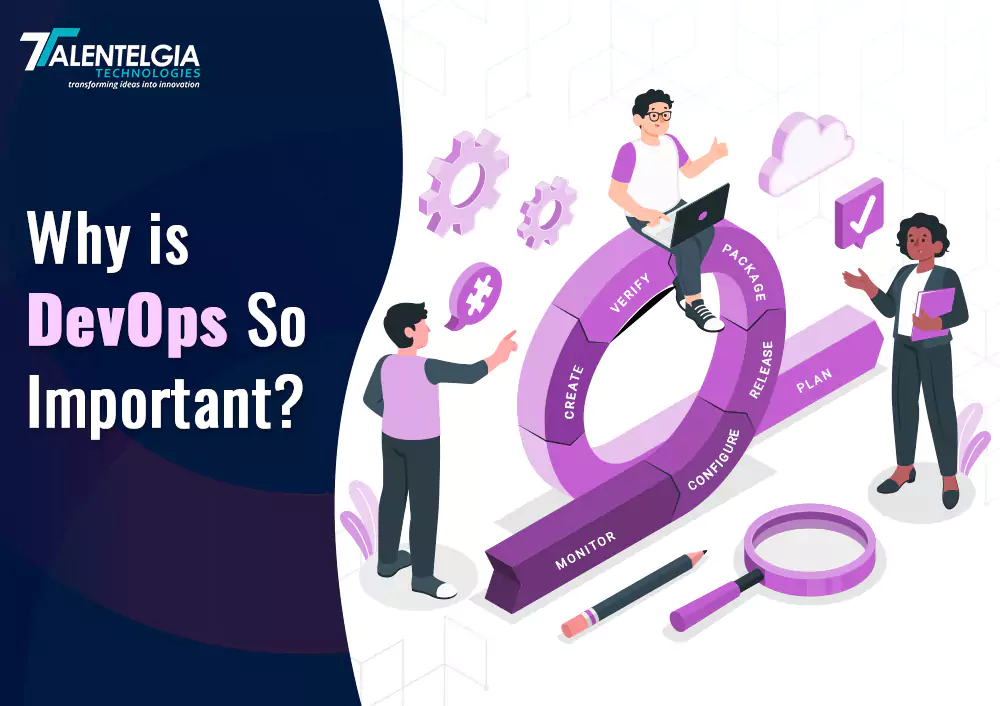
DevOps stands as the ultimate goal for every team, representing a shift from traditional methodologies (like the waterfall model) to iterative, Agile, and DevOps practices within organizations.
By 2030, the global DevOps market is projected to yield approximately USD 57.90 billion, growing at a 24.2% CAGR from 2021.
DevOps development services direct attention from development solely towards delivery, a nuanced yet pivotal shift. However, beyond its technical aspects, it primarily embodies a cultural transformation—a mindset in development that prioritizes teamwork and open communication above all else.
It’s about streamlining intricate manual processes into a refined approach that emphasizes speed, significantly reduces errors, enhances scalability, and boosts productivity. To overcome these challenges, consider enrolling in a comprehensive DevOps foundation certification course to gain the necessary skills and knowledge.
A well-implemented DevOps architecture can profoundly impact businesses by improving efficiency and optimizing crucial yet often overlooked aspects.
Benefits of DevOps
Adopting DevOps revolutionizes how software development and operations function. It goes beyond just improving efficiencies and transforms how teams collaborate, which leads to innovation and reshaping company cultures. DevOps isn’t merely a method; it’s a driver of business growth. Exploring its advantages reveals its significant impact on productivity, quality, and adaptability in today’s ever-changing market.
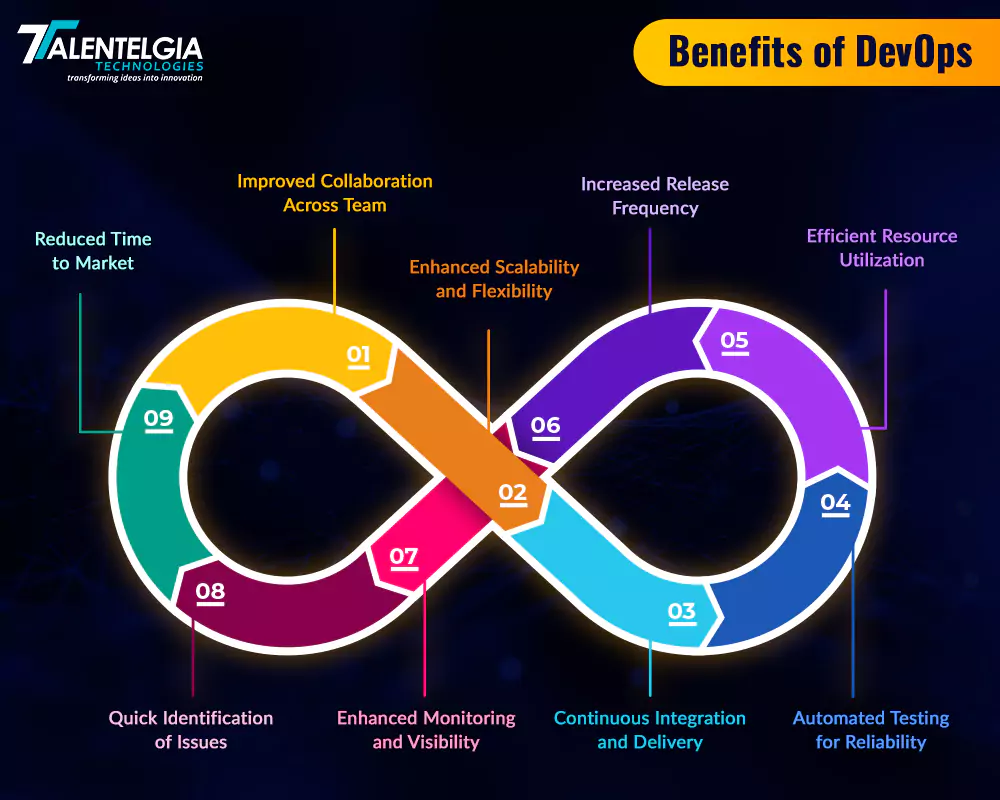
DevOps shines as a guide for making processes smoother and driving innovation through better teamwork. However, adopting DevOps comes with its own set of challenges that require thoughtful handling. It’s not just about upgrading tools; it involves rethinking how things are done within a company. Grasping these hurdles is key to making the most of DevOps in today’s fast-paced and competitive business world.
Common DevOps Challenges and Solutions
Let’s now delve into the common challenges faced in DevOps and explore their solutions for smoother implementation and operations.
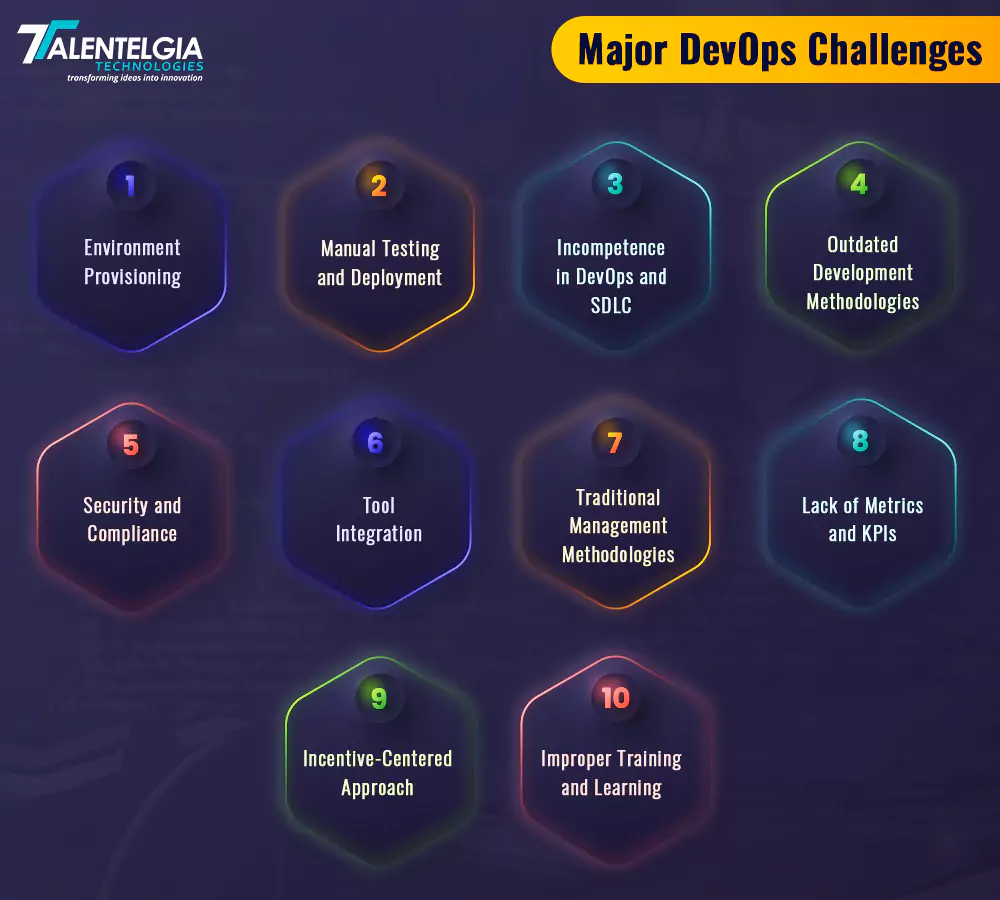
DevOps Challenge: Environment Provisioning
In the implementation of DevOps, environment provisioning emerges as a crucial hurdle. This revolves around the creation and administration of essential development, testing, and production environments required for software development. Manual provisioning of these environments can result in time-consuming processes prone to errors, ultimately causing delays in software delivery and deployment.
Possible Solution
To handle such technical DevOps challenges and solutions, it’s essential to maintain uniformity across all environments. This is achieved through crafting infrastructure blueprints and embracing Continuous Delivery (CD). Collaboratively creating a shared blueprint for DevOps execution and integrating continuous delivery ensures a cohesive approach for the entire team to navigate through the process seamlessly.
with Expert DevOps
Services. Enhance your operations top-notch
DevOps experts. Trusted by clients
across 20+ countries.

DevOps Challenge: Manual Testing and Deployment
In the development process, relying on manual intervention during the testing and deployment phases is not recommended. It drastically impacts efficiency, time consumption, and accuracy. Human errors and inconsistent procedures often stem from manual intervention. Opting for manual testing makes it challenging to implement agile CI/CD pipelines. Additionally, manual testing elevates the risk of product defects, leading to unforeseen efforts.
Manual deployment substantially raises the likelihood of failures, diminishing quality and reliability while amplifying unforeseen efforts.
Possible Solution
To address DevOps challenges and solutions linked to manual testing and deployment, consider automating both the framework and deployment processes. This enhancement will positively impact the overall process and strategy. Every organization aspiring towards DevOps development Services should prioritize incorporating automated testing procedures within their deployment processes. This approach will effectively decrease deployment failures.
DevOps Challenge: Incompetence in DevOps and SDLC
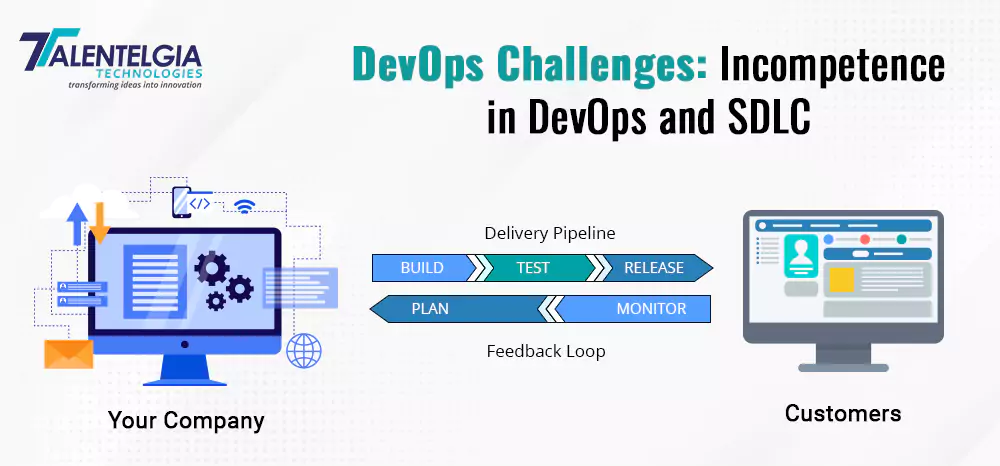
The effectiveness of the Software Development Lifecycle (SDLC) significantly influences software delivery and deployment. By instituting a methodical and coherent SDLC, an organization aims to furnish high-quality and dependable software within specified timelines. However, the software development industry has long grappled with achieving maturity in SDLC practices.
In the DevOps era, characterized by frequent, reliable software releases, possessing a mature process becomes even more pivotal for a team. Yet, some organizations struggle to align with its agility. In many cases, these organizations either lack maturity in their processes or incorrectly presume they have comprehensive knowledge.
Also Read: DevOps in Software Development
Possible Solution
Organizations ought to embrace the journey of adopting advanced DevOps tools and technologies. Simultaneously, they must facilitate their teams in acquiring proficiency in these newly adopted technologies through appropriate training.
Teams need to consistently solicit and incorporate feedback, focusing on continuous improvement. While investing resources in comprehensive solutions, teams can streamline DevOps deployment, expediting feature delivery and minimizing failures.
DevOps Challenge: Outdated Development Methodologies
Outmoded development approaches stand as a primary challenge within DevOps, manifesting in segregated teams within organizations dedicated solely to specific operations such as application testing. These teams operate independently, lacking active engagement with other departments.
Consequently, collaboration is confined to an ongoing cycle where code is dispatched for testing, findings are relayed back to developers by the QA team, and subsequent rectifications and redeployments are undertaken by the developer team. This perpetual process leads to a recurring gathering of teams to negotiate which identified bugs are permissible for production. Each release exacerbates technical debt within the system, eroding its quality and stability while amplifying the burden of unforeseen tasks.
Possible Solution
Avoiding the advancement of bugs within the development process is more favorable. Achieving this involves crafting automated test frameworks that trigger a build failure upon any test failures. This approach aligns with the principles of Continuous Integration (CI), emphasizing the integration of testing within the development workflow. Hence, testing ought to be an integral component of the development phase.
DevOps Challenge: Security and Compliance
Within a DevOps framework, it remains important to embed security and compliance protocols at each phase of the software delivery continuum. Neglecting this integration could lead to security breaches, breaches of regulations, and harm to one’s reputation.
Organizations encounter several problems in this, including inadequate security knowledge, segregated teams, and the complexity of upholding compliance standards across diverse geographical locations and industries.
Possible Solution
To overcome these hurdles, you can implement various approaches. These include ingraining security and compliance into the fabric of DevOps culture, employing automated security testing tools, and conducting routine compliance assessments.
Furthermore, your team can utilize methodologies and tools like security as code and infrastructure as code to maintain uniformity in security and compliance measures throughout the entire software delivery process.
By taking proactive steps to address security and compliance issues, organizations can ensure that their software products are not only delivered expediently but also adhere to the most rigorous standards of security and compliance.
DevOps Challenge: Tool Integration
Organizations embracing DevOps often employ a multitude of tools and technologies to oversee diverse facets of their software development and delivery pipelines. These tools encompass functions like source code management, automated build and deployment, test automation, and monitoring and logging solutions, among others. Yet, effectively harmonizing these tools poses a significant challenge during DevOps implementation.
The repercussions of inadequate tool integration manifest as teams spending valuable time on manual tasks like:
- Transferring data between tools manually
- Addressing discrepancies and overseeing integrations instead of dedicating efforts to value-driven activities such as feature development and delivery. This can lead to protracted development cycles and diminished software quality.
Possible Solution
Dealing with this challenge means using a connected set of tools that give everyone a clear view of the whole software delivery process. You can do this by picking tools that work well together or by using APIs to link different tools.
Also, if you use a DevOps platform that brings lots of tools together, it makes managing them much easier for teams. This way of working improves how DevOps tasks get done, helping you release software faster and with better quality.
DevOps Challenge: Traditional Management Methodologies
Several organizations have long relied on traditional change management methodologies, finding comfort in their familiarity. These ways were set up back when managing change meant bringing in extra resources.
However, in today’s context, applications are composed of numerous small components or microservices that allow for swift modifications and deployment. Consequently, the established processes can suddenly pose impediments.
There’s a need for proactive handling of immediate changes and deployments. At times, teams encounter multiple checkpoints such as security, operational, and code reviews. Yet, a notable setback arises from the considerable queue for reviews, often resulting in further delays of the review processes by an additional week.
Possible Solution
Companies need to get agile and switch up their way of doing things from the usual methods. For instance, rather than relying on authority, it’s better to encourage independence for making quick decisions or ensure that changes are released right from the start of the development process.
Another thing is to be ready for things not going as planned and reduce how much a change can mess things up, and make adopting DevOps difficult. It’s a good idea to test all your code changes in a separate setting and roll them out in stages to handle this better.
DevOps Challenge: Lack of Metrics and KPIs
Implementing DevOps presents challenges in gauging its effectiveness without the requisite metrics and performance indicators. The absence of these critical measurement tools hinders the ability to assess progress accurately and make data-driven decisions.
Here’s the Impact of this:
- Teams might not fully understand how their work affects the whole organization.
- It’s a struggle to figure out if they’re hitting their targets or not.
Possible Solution
It’s important to pick the right measures and indicators that match what your organization wants to achieve to mitigate this challenge head-on.
For instance, if you aim to up the number of deployments, you could track how often you’re deploying as a key metric.
Another thing that could help is having a dashboard to keep an eye on progress. It gives your teams a visual of how they’re doing towards their goals. This way, they can use data to make smart choices and tweak their methods when necessary.
DevOps Challenge: Incentive-Centered Approach
The development teams aim to speed up getting products to market, while the operations team takes care of security, reliability, availability, and governance. Even though it might seem like these areas aren’t connected, they have a big impact on how DevOps works. Usually, each team looks out for its advantages instead of sharing a common goal of making customers happy.
When teams have different goals, they often argue about what should come first and where to focus resources. If this keeps happening, it’ll be tough to solve the DevOps puzzle for a while.
Possible Solution
Thinking about what works best for the organization, management should think about changing how they reward employees to tackle these DevOps challenges and find relevant solutions. If everyone’s success is measured in a way that supports these rewards, it’s a win for everyone, especially the customers.
DevOps Challenge: Improper Training and Learning
A major problem that an organization encounters while rolling out DevOps is not giving enough training and education to the teams. When your team members don’t get the right training, they might not have the skills needed to use DevOps practices and tools well. This can lead to errors, hold-ups, and, in the end, projects that don’t succeed.
Possible Solution
To solve this issue, your organization can invest in training and educational programs. These programs will equip your teams with the knowledge and skills needed to implement DevOps effectively. They can take various forms, like online courses, workshops, and training sessions.
Moreover, your organizations can encourage a culture of ongoing learning. This means motivating team members to regularly enhance their skills. Initiatives like hackathons, informal learning sessions, and mentorship programs can help achieve this.
By providing ample training, and education, your organization can ensure a successful DevOps implementation. This equips your teams with the skills required for continual improvement.
FAQs
What are the Challenges and risks of DevOps implementation?
Implementing DevOps may face challenges in tool integration, cultural shifts, and adapting workflows. Risks include security vulnerabilities and insufficient training, impacting efficiency and deployment quality.
What problems does DevOps solve?
DevOps resolves issues related to slow deployment, siloed teams, and manual processes. It streamlines collaboration, enhances automation, and boosts software delivery speed and quality.
Conclusion
Making DevOps work might seem hard, but if you overcome the challenges and understand them, you can make the most of it. Issues like setting up environments or not having enough training can be fixed by using good methods like building a culture where people work together, communicate well, use automation, and collaborate. That's why your organizations need to follow the best ways of doing DevOps development services and get help from experts like DevOps Consulting & Implementation Services. With the right approach and support, your organizations can enjoy what DevOps offers and grow with new ideas and progress.


 Healthcare App Development Services
Healthcare App Development Services
 Real Estate Web Development Services
Real Estate Web Development Services
 E-Commerce App Development Services
E-Commerce App Development Services E-Commerce Web Development Services
E-Commerce Web Development Services Blockchain E-commerce Development Company
Blockchain E-commerce Development Company
 Fintech App Development Services
Fintech App Development Services Fintech Web Development
Fintech Web Development Blockchain Fintech Development Company
Blockchain Fintech Development Company
 E-Learning App Development Services
E-Learning App Development Services
 Restaurant App Development Company
Restaurant App Development Company
 Mobile Game Development Company
Mobile Game Development Company
 Travel App Development Company
Travel App Development Company
 Automotive Web Design
Automotive Web Design
 AI Traffic Management System
AI Traffic Management System
 AI Inventory Management Software
AI Inventory Management Software
 AI Software Development
AI Software Development  AI Development Company
AI Development Company  AI App Development Services
AI App Development Services  ChatGPT integration services
ChatGPT integration services  AI Integration Services
AI Integration Services  Generative AI Development Services
Generative AI Development Services  Natural Language Processing Company
Natural Language Processing Company Machine Learning Development
Machine Learning Development  Machine learning consulting services
Machine learning consulting services  Blockchain Development
Blockchain Development  Blockchain Software Development
Blockchain Software Development  Smart Contract Development Company
Smart Contract Development Company  NFT Marketplace Development Services
NFT Marketplace Development Services  Asset Tokenization Company
Asset Tokenization Company DeFi Wallet Development Company
DeFi Wallet Development Company Mobile App Development
Mobile App Development  IOS App Development
IOS App Development  Android App Development
Android App Development  Cross-Platform App Development
Cross-Platform App Development  Augmented Reality (AR) App Development
Augmented Reality (AR) App Development  Virtual Reality (VR) App Development
Virtual Reality (VR) App Development  Web App Development
Web App Development  SaaS App Development
SaaS App Development Flutter
Flutter  React Native
React Native  Swift (IOS)
Swift (IOS)  Kotlin (Android)
Kotlin (Android)  Mean Stack Development
Mean Stack Development  AngularJS Development
AngularJS Development  MongoDB Development
MongoDB Development  Nodejs Development
Nodejs Development  Database Development
Database Development Ruby on Rails Development
Ruby on Rails Development Expressjs Development
Expressjs Development  Full Stack Development
Full Stack Development  Web Development Services
Web Development Services  Laravel Development
Laravel Development  LAMP Development
LAMP Development  Custom PHP Development
Custom PHP Development  .Net Development
.Net Development  User Experience Design Services
User Experience Design Services  User Interface Design Services
User Interface Design Services  Automated Testing
Automated Testing  Manual Testing
Manual Testing  Digital Marketing Services
Digital Marketing Services 
 Ride-Sharing And Taxi Services
Ride-Sharing And Taxi Services Food Delivery Services
Food Delivery Services Grocery Delivery Services
Grocery Delivery Services Transportation And Logistics
Transportation And Logistics Car Wash App
Car Wash App Home Services App
Home Services App ERP Development Services
ERP Development Services CMS Development Services
CMS Development Services LMS Development
LMS Development CRM Development
CRM Development DevOps Development Services
DevOps Development Services AI Business Solutions
AI Business Solutions AI Cloud Solutions
AI Cloud Solutions AI Chatbot Development
AI Chatbot Development API Development
API Development Blockchain Product Development
Blockchain Product Development Cryptocurrency Wallet Development
Cryptocurrency Wallet Development About Talentelgia
About Talentelgia  Our Team
Our Team  Our Culture
Our Culture 
 Healthcare App Development Services
Healthcare App Development Services Real Estate Web Development Services
Real Estate Web Development Services E-Commerce App Development Services
E-Commerce App Development Services E-Commerce Web Development Services
E-Commerce Web Development Services Blockchain E-commerce
Development Company
Blockchain E-commerce
Development Company Fintech App Development Services
Fintech App Development Services Finance Web Development
Finance Web Development Blockchain Fintech
Development Company
Blockchain Fintech
Development Company E-Learning App Development Services
E-Learning App Development Services Restaurant App Development Company
Restaurant App Development Company Mobile Game Development Company
Mobile Game Development Company Travel App Development Company
Travel App Development Company Automotive Web Design
Automotive Web Design AI Traffic Management System
AI Traffic Management System AI Inventory Management Software
AI Inventory Management Software AI Software Development
AI Software Development AI Development Company
AI Development Company ChatGPT integration services
ChatGPT integration services AI Integration Services
AI Integration Services Machine Learning Development
Machine Learning Development Machine learning consulting services
Machine learning consulting services Blockchain Development
Blockchain Development Blockchain Software Development
Blockchain Software Development Smart contract development company
Smart contract development company NFT marketplace development services
NFT marketplace development services IOS App Development
IOS App Development Android App Development
Android App Development Cross-Platform App Development
Cross-Platform App Development Augmented Reality (AR) App
Development
Augmented Reality (AR) App
Development Virtual Reality (VR) App Development
Virtual Reality (VR) App Development Web App Development
Web App Development Flutter
Flutter React
Native
React
Native Swift
(IOS)
Swift
(IOS) Kotlin (Android)
Kotlin (Android) MEAN Stack Development
MEAN Stack Development AngularJS Development
AngularJS Development MongoDB Development
MongoDB Development Nodejs Development
Nodejs Development Database development services
Database development services Ruby on Rails Development services
Ruby on Rails Development services Expressjs Development
Expressjs Development Full Stack Development
Full Stack Development Web Development Services
Web Development Services Laravel Development
Laravel Development LAMP
Development
LAMP
Development Custom PHP Development
Custom PHP Development User Experience Design Services
User Experience Design Services User Interface Design Services
User Interface Design Services Automated Testing
Automated Testing Manual
Testing
Manual
Testing About Talentelgia
About Talentelgia Our Team
Our Team Our Culture
Our Culture
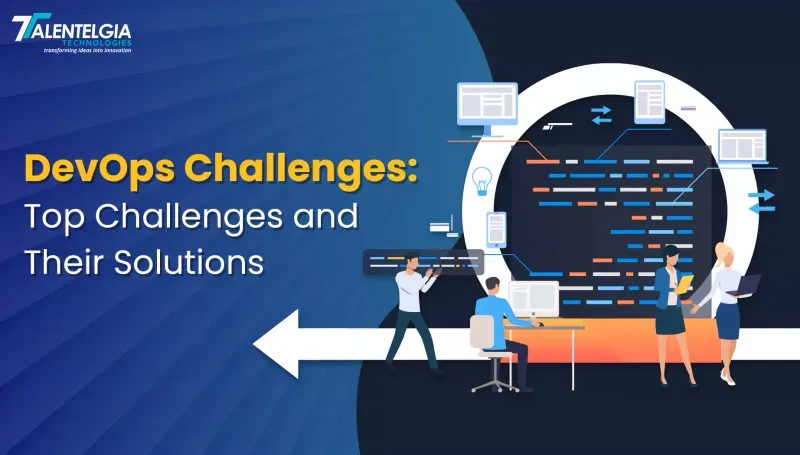

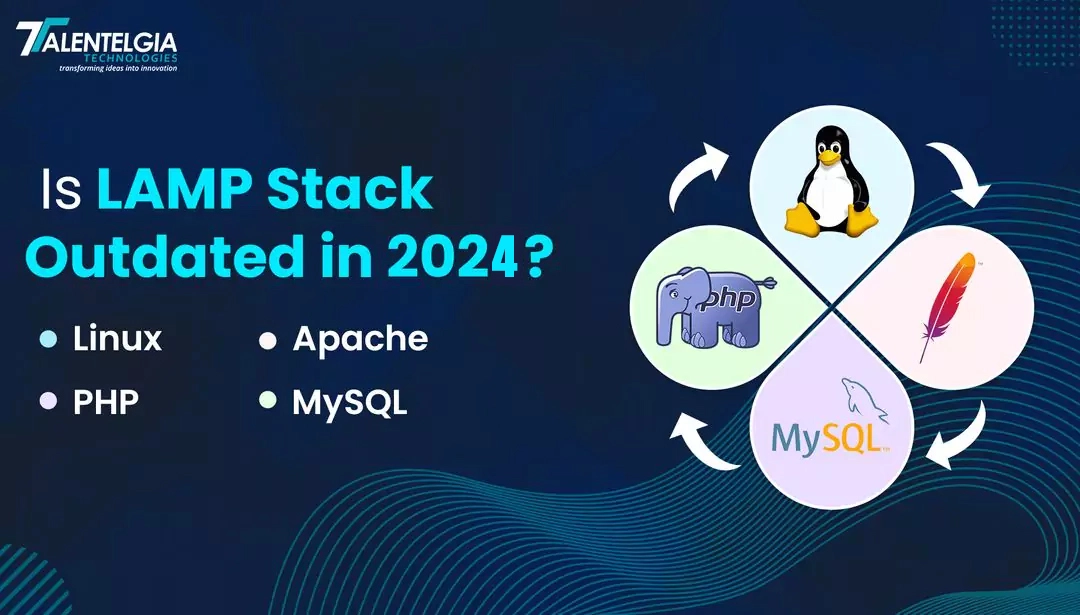














 Write us on:
Write us on:  Business queries:
Business queries:  HR:
HR: 




